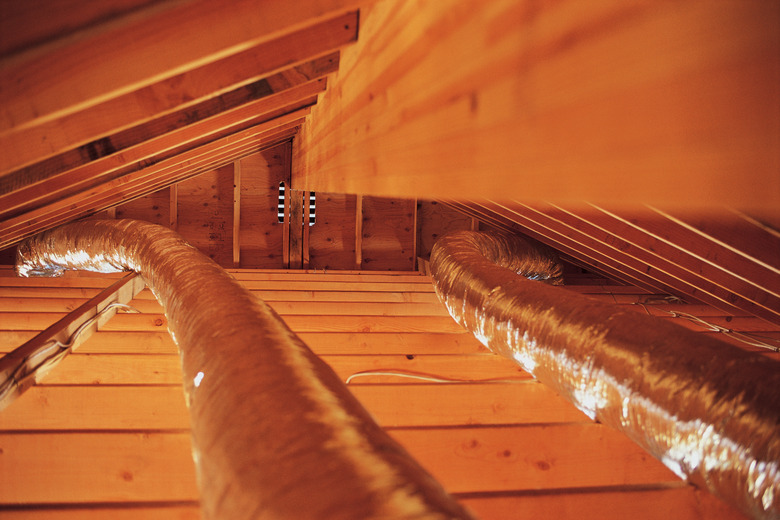How To Run Wire Through An Attic
Things Needed
-
Measuring tape
-
Drill
-
Utility knife
-
Ladder
-
Staplegun
-
Wiring staples
-
Flashlight
-
Length of plank, optional
-
Fish tape, optional
-
Dust mask
-
Gloves
-
Eye protection
New lighting, cable, computer networking and sound systems can all require wiring that may need to come through the ceiling. On a single-story home or the the upper floor of a multiple story home, this means accessing your attic to run wire. Attempting the job without preparation and taking the proper precautions can cost you time or money, and can even be a serious safety hazard.
Step 1
Measure the distance between the two sites you want to run wire between and make sure you will have enough wire. Don't forget to include the vertical distance up to the attic and back down again.
Step 2
Find your attic access. This is usually a moveable piece of drywall or plywood that covers a rectangular hole in the ceiling. It is usually located in a hallway, a closet, or sometimes in the garage.
Step 3
Climb through the attic access, using a ladder if necessary and look into the attic space. With a flashlight, examine the attic and locate the path that you will use to run the wire between the two locations. Familiarize yourself with the footing situation. When there is no flooring to walk on other than the edges of the trusses, consider bringing a piece of plank or two you can lay across the trusses as a walkway. Check if insulation hides the trusses or poses a breathing problem. Note the location of pipes, ducts and existing wiring. Ensure that the location for your new wiring does not interfere with existing systems.
Step 4
Put on a dust max, eye protection and gloves.
Step 5
Cut the holes that the wire will pass through to enter and exit the attic. Depending on what the wiring is for, this may be go through the drywall to the ceiling, for instance for new lighting, or be farther down on a wall. If you will need to fish wiring through a wall, drill a hole through the wood plate in the attic only. and use semi-rigid, wiring fish tape to pull your wiring down to your outlet location. When cutting through drywall from the interior of a room,Use a utility knife and cut carefully — you don't want to drill through a hidden wire or the paper backing of the attic insulation. If the sites that you want to run wire to are on the outside of the house, you should not need to drill a new hole. Look for vents of other small holes underneath your roof's awning. If you can't find a useable opening, use a drill to make your own.
Step 6
Bring all of the wire up into the attic. While one person holds the flashlight, the other person should use a staple gun to run the wire along the rafters from one entry hole to the other. The staple gun should be loaded with wire staples designed for holding the size and type of wire you are running. Staples that are too small may puncture the wire and could possibly break the connection or cause a fire hazard.
Step 7
Once you are running the wire, feed both ends of the wire through their corresponding holes and climb down from the attic. There should be no excess wire or ends left in the attic.
Step 8
Locate the wires at the sites where you fed them to from the attic and complete your connections first, then secure or conceal the rest of the wire.
Tip
If you anticipate needing to run wire for any other project, you might want to consider running wire for both projects at the same time. You may save yourself some extra work. Cable television or computer networking wiring should be run at least 12 inches away from electrical wiring. If it needs to cross electrical wiring, do so at a 90-degree angle. Do not cut wiring from the spool until you have the wire all the way to its destination. Work early in the day to avoid overheating.
Warning
Ensure the power is off when running electrical wire and making connections to the new wiring.
